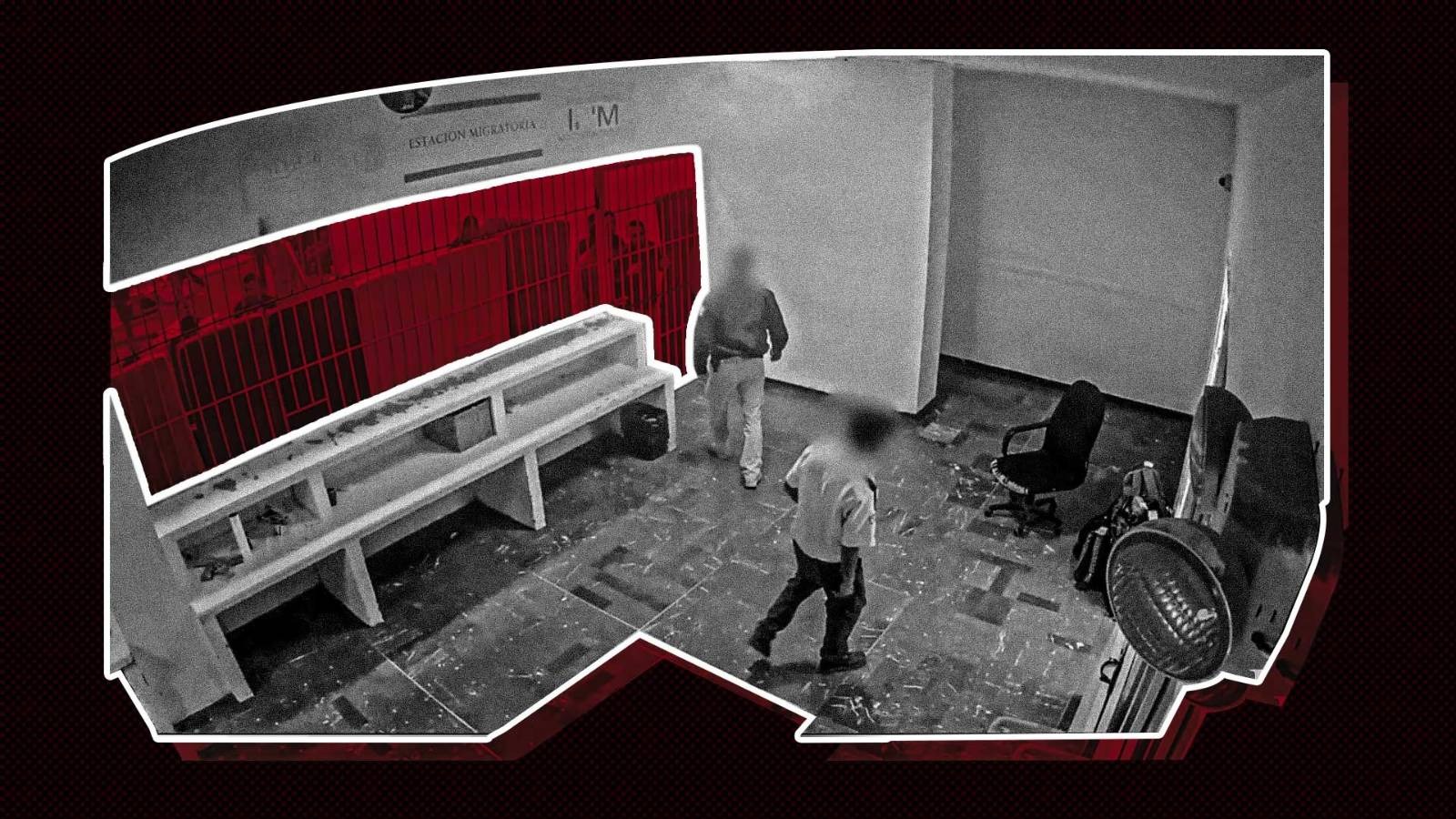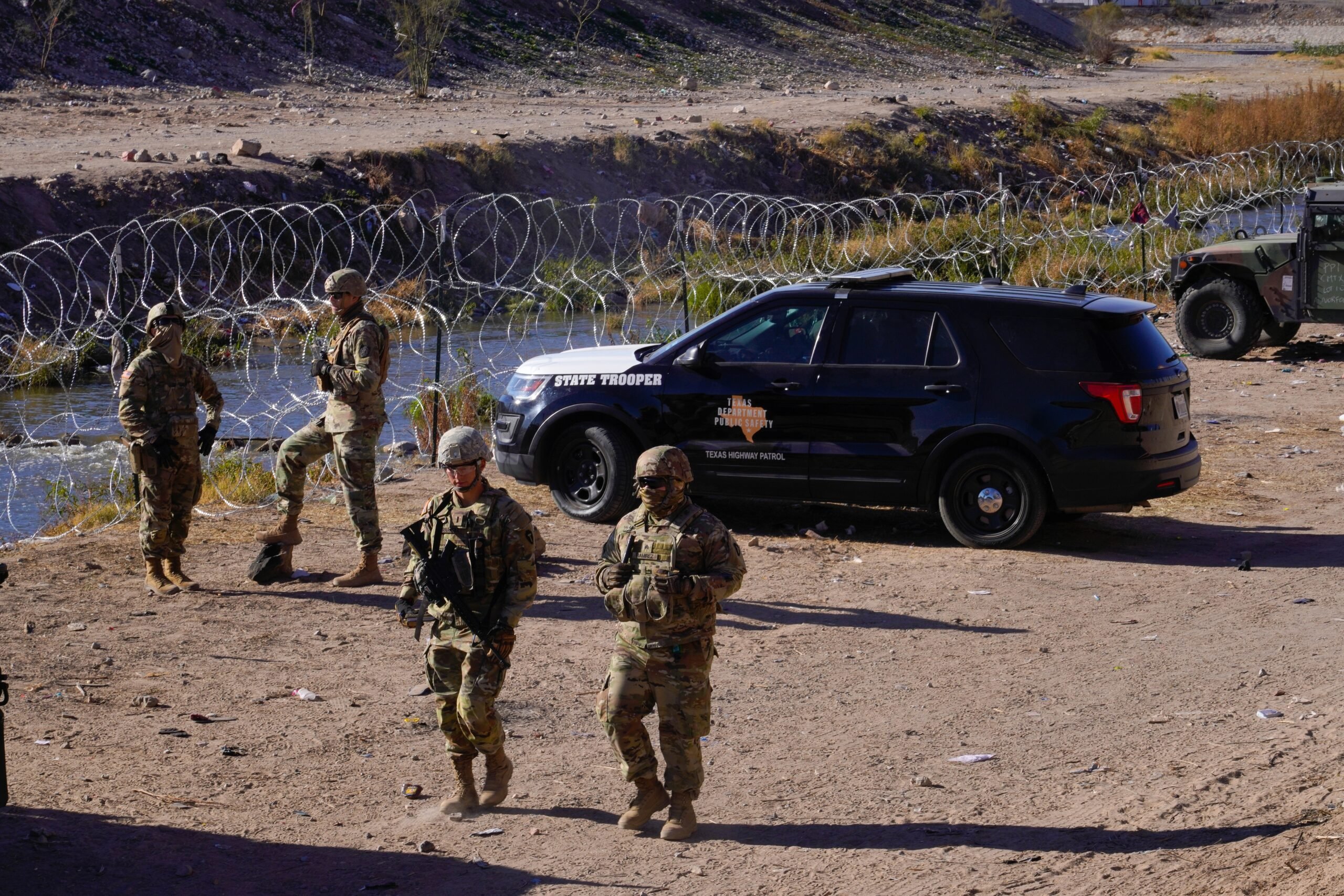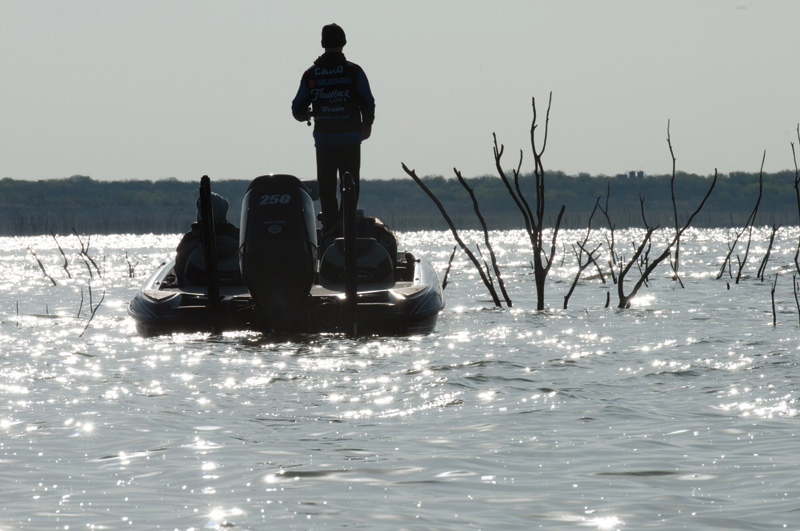
Postcards: Hook, Line and Sinker
Above: Pro angler Brandon Card fishes in Mexican waters on Falcon Lake. One time use only photo.
Before the sun has risen on the morning of March 25, 12 men who catch and release fish for a living stand aboard their boats at the Zapata County boat ramp on Falcon Lake. They fuss in the darkness with thick bundles of fishing rods and rubbery lures. They cinch heavily logoed jackets tight against the frigid air. They think about where the fish are, what the fish are doing.
Of the 12 men, culled from 100 competitors, two stand the best chance of winning the Bassmaster Elite Series tournament’s $100,000 first-place payout. Keith Combs, a rising star from Huntington, Texas, has topped the four-day tournament’s leader board since Day 1, when he reeled in five bass (the tournament’s daily limit) weighing a cumulative 34 pounds and 13 ounces. Rick Clunn, a quirky 67-year-old and one of bass fishing’s most revered anglers, known to fans as the “Zen Master,” has landed bigger and bigger fish each day, closing on Combs. Today, the tournament’s last, Clunn is just a pound behind Combs in total weight.
As the anglers wait for the official 7:30 a.m. start, Combs appears anxious, Clunn calm and composed. Combs, who’s 38 but looks a decade younger, wears a nervous smile while an ESPN2 cameraman films him chatting with fans. Clunn, face obscured with a scruffy white beard, dark sunglasses, and a hat pulled low on his forehead, peers stoically across the calm water.
After speakers play the national anthem, the tournament announcer bellows introductions into his microphone. The fishermen fire up the hulking outboard motors on their sleek 21-foot bass boats and shoot out onto Falcon Lake one at a time.
Combs points his boat southwest, toward Falcon Dam, the concrete barrier responsible for this 40-mile reservoir on the Rio Grande. Clunn heads for a thicket of underwater trees just a mile from the boat ramp.
Other anglers race toward fishing holes on the Mexico side of the international border—an imaginary line running down the middle of Falcon Lake—in spite of warnings from local law enforcement. At a meeting prior to the start of the tournament, officers from the Zapata County sheriff’s department, Border Patrol and Texas Parks & Wildlife—all of whom patrol Falcon Lake—told the anglers, “We can’t help you once you cross into Mexico.”
The anglers have certainly heard about Falcon Lake’s Mexican pirates—the issue was a weeklong fetish of cable TV news a few years back—and of American jet-skier David Hartley, allegedly gunned down by the Zetas cartel in 2010. They also know the lake’s bass receive less fishing pressure on the Mexico side. They see fewer artificial lures there. They more frequently take the bait.
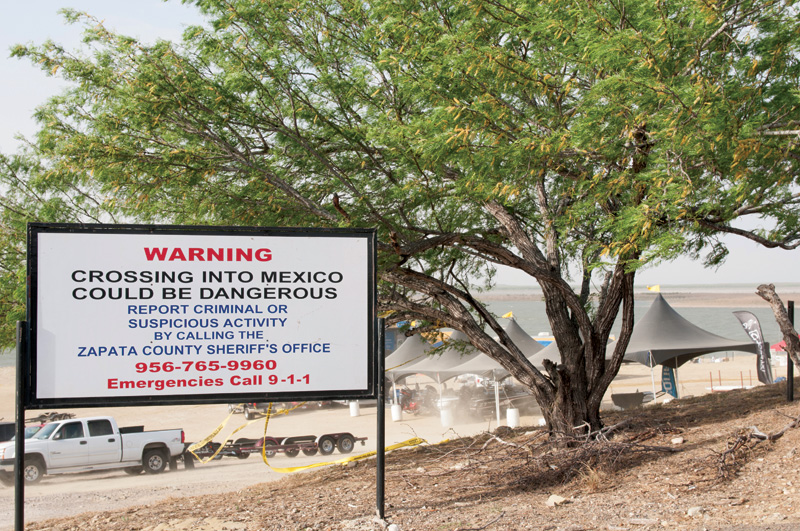
In 1953, Dwight D. Eisenhower and Mexican President Adolfo Ruiz Cortines dedicated Falcon Dam—named for the border town it flooded—to the people of both countries for irrigation, flood control and hydroelectricity. As the backed-up Rio Grande swelled over its banks, the towns of Zapata, in Texas, and Guerrero, in Mexico, were relocated to higher ground.
Twenty-two years later, Texas Parks & Wildlife stocked the lake with 750,000 Florida largemouth bass, a notoriously feisty sport fish that can grow up to five pounds larger than native Texas largemouths. The bass flourished. When the lake periodically recedes, mesquite and wild olive trees prevalent to this South Texas brush country sprout on the damp shoreline. When the lake rises, that swamped foliage makes ideal habitat for bass.
Falcon soon gained a local reputation for monster bass as big as 15 pounds. But because of Falcon’s remoteness—50 miles from Laredo, the nearest city of consequence—few fishermen beyond Texas were in on the secret.
Then, in 2008, the world’s biggest fishing tournament rolled into dusty little Zapata, population 5,089. The Bassmaster Elite Series unloaded a sprawling expo center and a giant weigh-in stage. Bassmaster veteran Paul Elias broke the tournament’s all-time weight record, landing 132 pounds and 8 ounces of fish. Suddenly everyone wanted a piece of Falcon Lake’s bass.
Anglers from Missouri and Michigan and Minnesota bought vacation houses along Falcon’s shores. Tom Bendele, who’d fished Falcon since he was a kid, and in 2008 opened a tackle shop across the street from the county boat ramp, says business increased by a “gazillion.” Visiting fishermen gobbled Mexican food at local restaurants and parked expensive fishing rigs at the local Holiday Inn.
Across the border in Mexico, a bloody drug war gripped the state of Tamaulipas as the rival Gulf and Zetas cartels battled over smuggling routes for drugs, guns, cash and humans. In 2010, stories of rogue cartel members robbing American fishermen on the lake began to surface.
On May 17, 2010, the Texas Department of Public Safety posted an advisory detailing three incidents on Falcon Lake over the span of a month—one of which allegedly occurred in U.S. water. A press release called the robbers “pirates,” and reported them boarding boats and demanding guns, drugs and money. In one account, men who called themselves federales, but wore no uniforms, took $200 from fishermen who had gone ashore in Mexico to explore the ruins of Old Guerrero, which rises from the lake when the water recedes. Another report described a Mexican pirate armed with an AR-15 boarding an American boat near the same ruins. “During the incident, he chambered a round in the rifle and told the fishermen that he would shoot them if they did not give him money,” the advisory stated. DPS recommended that boaters keep to the U.S. side of the lake.
Then, on September 30, a young couple from McAllen, Tiffany and David Hartley, set out on personal watercraft to take photos of the partially submerged church in Old Guerrero, seven miles up the Salado River in Mexico. Tiffany later said that shots rained around them, and that David took a bullet in the back of his head. As she tried to drag David aboard her Sea-Doo, Tiffany said, the shooters circled in their boat, but didn’t fire. Unable to save her husband, she fled back to the U.S.
National media swarmed Zapata. County Sheriff Sigi Gonzalez, founder of the Texas Border Sheriff’s Coalition, who one law-enforcement official told me “likes the spotlight,” touted the murder as an example of his region’s lack of security (and thus its need for increased federal funding). In 2011 Gonzalez testified before the House Committee on Homeland Security, claiming that unnamed informants had alerted him to cartel turf wars and attempted kidnappings in Zapata. (Gonzalez didn’t mention that his county’s crime rate is one-fifth the national average.)
As word of the danger spread, fishing tourism dwindled. Rooms at hotels and lakeside lodges went unrented. Bendele says his sales dropped by half. Last April, when Bassmaster magazine ranked Falcon Lake the best bass-fishing lake in the U.S., the publication noted, “Falcon is without a doubt your best shot at a 10-pounder, but it has also gained a reputation as a good place to be, well, shot.”
Paco Mendoza, president of the Zapata Chamber of Commerce, chafed at the negative publicity. “These people sitting in news stations hundreds of miles away never thought about the damage they were causing our community,” he told me. “A couple years ago this place was a ghost town.”
This year, for an undisclosed fee ($60,000 is the word at the tackle shop), Zapata County Commissioners made a successful bid to bring the Bassmaster tournament back, and with it, the county hoped, positive national exposure.
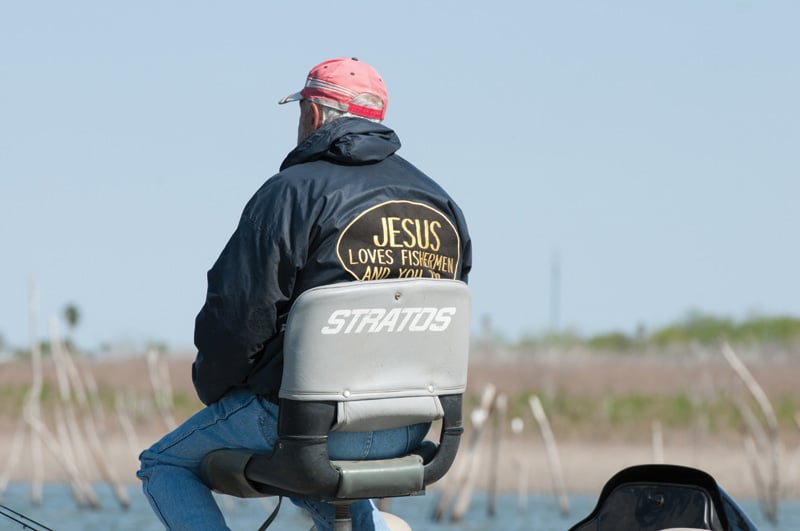
Back at the boat ramp on the tournament’s final day, I climb aboard a Bassmaster media boat with local fishing guide Tim Griffin. A big man with a closely cropped red mustache and a well-worn “Texas B.A.S.S.” (Bass Anglers Sportsman Society) baseball cap, Tim says he grew up in Zapata, fishing Falcon Lake.
After high school he’d made a good living working the area’s abundant gas wells, but with natural gas prices at a record low, Tim now guides full time, charging $400 a day to help fishermen find and land Falcon’s bass. He knows every inch of the lake and nearly every tale ever told on its water.
“Ever ridden on a boat before?” Tim asks me.
“Of course,” I reply.
“Good,” he says, throwing the throttle forward and putting the boat on plane. As we skim across the lake at 70 miles per hour, the wind makes my eyes water and my cheeks jiggle.
Moments later, we’re one of several spectator boats floating quietly a few hundred feet from Clunn, who’s casting an RC2 Luck-E-Strike Square Bill Crankbait of his own design into a grove of skinny trees sticking a few feet out of the water. Tim tells me bass congregate near the trees, and Clunn is trying to land his lure on one’s head. But the water is cold and the fish aren’t hunting yet. We move on.
Next Tim trolls our boat near pro angler Brandon Card, who yells over to us, “I need some luck.” On the Mexican shore, just beyond Card’s boat, I spot a small fishing camp comprising weather-beaten shacks and small white motorboats. The camp’s men fish for sustenance, stringing nets that capture tilapia, gar, crappie and bass (to the annoyance of many sport anglers).
Then Card gets a bite. His rod arches in a large upside-down U and quickly snaps straight again, the line broken. “No!” he shouts, pounding the butt of the rod against the boat’s deck, looking for answers in the cloudless blue sky.
“That was a freaking pig,” Tim shouts to Card. Come back to this spot later, Tim says, and Card might catch the same lunker with the snapped-off lure still hanging from its lip. He’s seen it happen before.
We take off again, and after a long, high-speed, cold ride, we arrive at the mouth of the Salado River, just a few miles from the infamous Old Guerrero Church. Here we watch a young Louisianan, Cliff Crochet, aka “The Cajun Baby,” make cast after fruitless cast.
Eventually I ask Tim, “So, what about those pirating incidents?”
“Dude…” Tim drawls. In his version of events, there were never any machine guns or cartel members. Some Mexicans had stolen a BassCat fishing boat and figured they could scare Americans into giving them money. They pretended to be stranded in the center of the lake, and when American fishermen sidled up to help, the Mexicans yelled, “Dame tú dinero puta!” Tim mimics the panicked fishermen, hurriedly fumbling through pockets and tossing wallets. Tim tells me he’d seen the BassCat abandoned on the Mexican shore. He says he knows the guy who later drove to Mexico to pick it up.
But what about Hartley? I ask. Life insurance scam, Tim says. They never found a body. Tim says he knows a cop who’d shared a few drinks with a guy from the Zapata County District Attorney’s Office who told him the DA’s position is that Hartley is alive in Mexico; authorities were just waiting for the wife to collect the insurance money before they nabbed him.
I’d read on a Texas bass-fishing forum about the theft of fishing rigs from Zapata hotel parking lots around the time of the alleged pirating incidents, and a CNN program about the Hartley murder had raised the possibility of a life-insurance scam. But when I later mentioned the theory to a former employee of the DA’s office, he scoffed. In October, Mexican authorities arrested Zetas cartel boss Salvador Alfonso Martinez Escobedo, who they claimed was responsible for Hartley’s murder.
Tim makes another point: “Even if someone did actually die on this lake, how many drunk people die on Lake Travis every year?”
As we watch Crochet cast in vain, our boat snags something under the surface and rocks from side to side. Tim stumbles but quickly regains his balance. “Ever fallen off before?” I ask him.
“Naw, dude,” he says. “I can’t swim.”
Around noon I take a break from the boats and spend a few hours touring Zapata. At El Paraiso (“The restaurant that made Zapata famous”) I eat a thick chicken-fried steak that flops over the edge of the plate, with sides of soup, French fries, beans, rice, salad, bread, and a cereal-sized bowl of cream gravy. It costs $8.
I tour the Frontier Museum, an adorably kitschy building with a large collection of rusty ranch relics and a live rattlesnake display. The gregarious owner, Myrna Manson, tells me she moved to Zapata from Minnesota 40 years ago. I buy a T-shirt bearing an image of the city’s namesake, Mexican revolutionary Emiliano Zapata, and the motto, “Prefiero morir de pie … que vivir de rodillas…” (“It is better to die on my feet … than live on my knees…”).
The strikingly modern Zapata County Museum of History is closed, so I walk across the street, through a park honoring Zapata’s veterans of foreign wars, to the county courthouse, whose gold-shingled dome is being refurbished. I’d filed a public information request about the Falcon Lake pirating incidents with the sheriff’s department, and I wanted to check on its status.
Last fall, Sheriff Sigi Gonzalez opted not to run for reelection after 18 years in office. Gonzalez had publicly feuded in the local newspaper with one of the town’s most influential businessmen, Renato Ramirez, the 72-year-old CEO of Zapata’s IBC Bank. Ramirez accused Gonzalez of over-hyping border violence—at the expense of local businesses—in pursuit of grant money to buy fancy toys for the sheriff’s department, like a fleet of shiny new pickups and SUVs and a “mobile command center” (which was prominently displayed at the county boat ramp).
Ramirez, who knows Falcon Lake intimately, vouches for its safety. As a kid he swam in the Salado River while visiting his grandmother in Old Guerrero, before the town’s flooding. The key to avoiding trouble on the lake, Ramirez told me, is to stay away from the Guerrero ruins, a known staging area for cartel drug runs. Ramirez says Gonzalez didn’t run for reelection “Because he knew I would come out full-blast against him, and he couldn’t win.” (Gonzalez said he bowed out for reasons of his own.)
At the office of the new sheriff, Alonso Lopez, I sit down with Chief Deputy Raymundo del Bosque Jr., a stout man wearing a felt cowboy hat and a gold star affixed to his crisp white shirt. Del Bosque, who started at the department January 1, says he’s working to get me the Hartley report. But, he says, “For those other dates and incident descriptions you sent us”—the pirating reports—“we don’t have anything.”
I’m confused. I had clipped detailed descriptions of the incidents from the DPS advisory, which cited law enforcement officials and investigators as sources, and pasted them into my public information request.
“Nothing?” I ask.
“Nothing,” he says. “No reports, no calls, nothing.”
“And it’s your department that would handle that, right?” I ask.
“Yes,” he says. “Anything that happens on the lake is our business.”
“So where did all these pirate stories come from?” I ask.
“I have no idea,” del Bosque tells me.
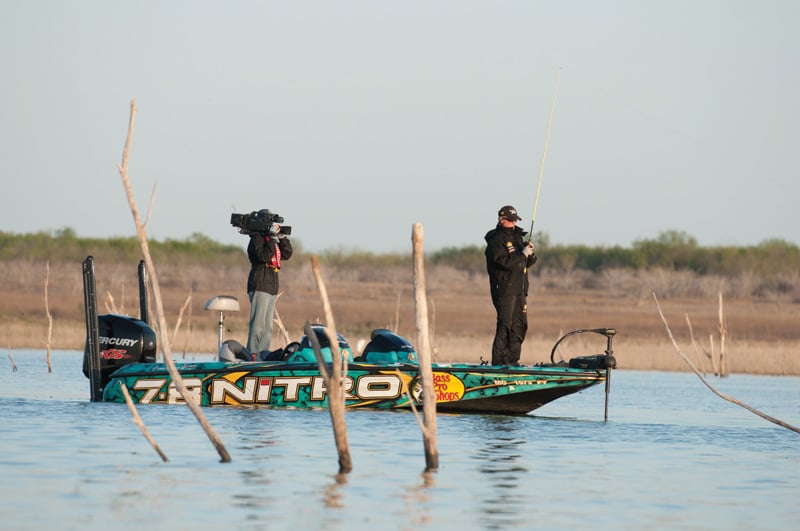
When I return to the boat ramp for the final weigh-in at 3 p.m. Monday afternoon—45 mph wind gusts on Sunday forced Bassmaster officials to postpone the tournament’s finale by a day—about a hundred people are gathered at the shore. On my way to the dock I see a large sign stating, “WARNING, CROSSING INTO MEXICO COULD BE DANGEROUS”—one of six placards Sheriff Gonzalez put up around the lake after the Hartley incident.
Soon I spot an armada of anglers racing down the lake toward the ramp. The guys with big fish pull right onto the shore, where fans and photographers wait. Anglers with meager hauls tie up farther down the shore, out of sight. I overhear competitor John Crews saying he caught an eight-and-a-half-pounder on his final cast. As he pulls the fish out of his boat’s live well to place it in a rubber sack, a cluster of fans snap photos and exclaim, “Oh, that’s a hog,” and “Damn, frickin’ swamp donkey.”
One by one the anglers take the stage and place their fish on the scales. Crews’ last-minute fish gives him the lead, and he moves to the “hot seat” (a stool, stage left). As Brandon Card faces the crowd to raise his two biggest bass above his head, the fish in his right hand squirms free and dives for the floor. Card catches the bass in mid-air by pinning it against the side of the podium. “Party foul,” he says, looking embarrassed.
Gary Klein, a 30-plus-year veteran of the sport, who’s earned nearly $2 million in Bassmaster winnings, comes to the stage and says hi to his daughters, Lakota and Canyon, who are watching the weigh-in via Bassmaster.com’s live stream. “Seems like the only time I get to see them is on the Internet,” Klein says. He’s caught just one fish, which weighs only a pound.
Then Zen Master Clunn raises his bag of fish with both hands and sets it on the scale. The crowd quiets. “Twenty-three pounds and three ounces!” the announcer shouts. Clunn, expressionless, takes Crews’ place on the hot seat.
Combs, who started the final day just one pound ahead of Clunn, will need more than 22 pounds and 3 ounces to win the tournament. On his way back from Falcon Dam, he’d hit one last sweet spot and hooked a 7-pound fish in the final 10 minutes of competition.
The 7-pounder makes the difference. Combs’ bag weighs 28 pounds, 2 ounces. The announcer hands him a giant trophy topped with a golden bass. Combs kisses the faux largemouth on the lips. His girlfriend, Jennifer Reid, throws up her arms and lets out a shrill scream. (The pair met when they were assigned to fish together at a couples fishing tournament.) Clunn claps politely.
As Combs signs autographs and poses for photos, I chat with Celia Balderas, Paco Mendoza’s only employee at the Chamber of Commerce. The national media exposure on Bassmaster.com and ESPN2 will prove invaluable to the county’s reputation, she says. But just one news crew out of a half-dozen Laredo and McAllen channels showed up at the weigh-in. “They come running when something bad happens,” Celia complains. “Where are they now?”
A Bassmaster pontoon boat named “Live Release” shuttles bass from the stage back out into the lake. Anglers get docked a quarter-pound if a fish dies. Of the thousand-plus fish caught over four days, fewer than a dozen don’t make it.
On the way out of Zapata, I pass a sign bearing the town’s logo—a cowboy riding a largemouth bass like a bucking bronco—and wonder if Falcon Lake’s pirates are just another fish tale, exaggerated with each retelling. When I later asked DPS for the source of the information in its advisory, the agency cited “intelligence” from various law-enforcement agencies. Former Sheriff Gonzalez told me Parks & Wildlife game wardens had filed the incident reports, not him. So I contacted Parks & Wildlife Captain Fernando Cervantes. Cervantes said he did write an official report on the alleged piracy incident involving the AR-15-wielding Mexican, which occurred in Mexican waters but has asked that the state Attorney General block its release. He couldn’t recall the other incidents described in the DPS advisory.
Whatever their sources, they seem to have gotten away.

